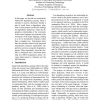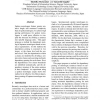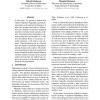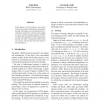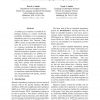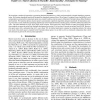113
click to vote
EMNLP
2009
14 years 12 months ago
2009
This paper describes an empirical study of high-performance dependency parsers based on a semi-supervised learning approach. We describe an extension of semisupervised structured ...
117
click to vote
ACL
2010
15 years 4 days ago
2010
In this paper we describe an intuitionistic method for dependency parsing, where a classifier is used to determine whether a pair of words forms a dependency edge. And we also pro...
131
click to vote
ACL
2006
15 years 3 months ago
2006
Spoken monologues feature greater sentence length and structural complexity than do spoken dialogues. To achieve high parsing performance for spoken monologues, it could prove eff...
114
click to vote
ACL
2006
15 years 3 months ago
2006
In this paper, we present a method that improves Japanese dependency parsing by using large-scale statistical information. It takes into account two kinds of information not consi...
101
click to vote
EMNLP
2008
15 years 3 months ago
2008
In this paper, we first introduce a new architecture for parsing, bidirectional incremental parsing. We propose a novel algorithm for incremental construction, which can be applie...
110
click to vote
EMNLP
2007
15 years 3 months ago
2007
We present a data-driven variant of the LR algorithm for dependency parsing, and extend it with a best-first search for probabilistic generalized LR dependency parsing. Parser act...
145
click to vote
EMNLP
2007
15 years 3 months ago
2007
We describe a two-stage optimization of the MaltParser system for the ten languages in the multilingual track of the CoNLL 2007 shared task on dependency parsing. The first stage...
157
click to vote
EMNLP
2007
15 years 3 months ago
2007
A notable gap in research on statistical dependency parsing is a proper conditional probability distribution over nonprojective dependency trees for a given sentence. We exploit t...
105
click to vote
LREC
2010
15 years 3 months ago
2010
We investigate a number of approaches to generating Stanford Dependencies, a widely used semantically-oriented dependency representation. We examine algorithms specifically design...
126
click to vote
COLING
2008
15 years 3 months ago
2008
Data-driven learning based on shift reduce parsing algorithms has emerged dependency parsing and shown excellent performance to many Treebanks. In this paper, we investigate the e...

